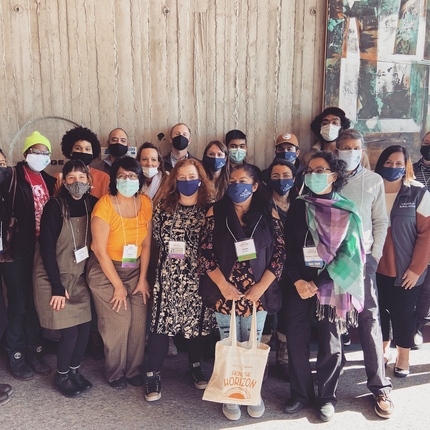Kirstin Bailey contributed to this story.
Decker Gabriel-Woods was drawn to sustainable agriculture when supply chain issues related to the worldwide COVID-19 pandemic alerted him to the problem of how people get food. The practice of farming, however, drew him to appreciate and cherish the earth.
Now, his goal is to protect it while growing food as a way to tap into his ancestral history.
Decker, who also goes by Dex, graduated from Carleton College in 2019 with a degree in American Studies. He thought agriculture was interesting and important. But, he didn't think it was the right fit for him because he never saw Black farmers.
“Then the pandemic hit and I started looking to YouTube and other sources for examples of Black farmers,” said Decker, who lives in Omaha, Nebraska. “During the summer of 2020, I went to Florida to meet some family, and they had gardens.”
He brought what he learned from his family back to his hometown and has since started Manifest Acres, an urban farm where he shares his passion for local food and nutrition with the community.
“I believe food has the power to heal the mind, body, and soul,” said Decker. “I want to share this power with the people and spread a deeper awareness of food.”
Decker strives to be a steward of the land, while helping others like himself gain access to and repair it.
On his quest to bring these practices and fresh, quality produce to his neighbors, Decker participated in the 2021 Aspiring Farmer Residency and Big Muddy Urban Farm, in Omaha. He also attended the Practical Farmers of Iowa conference in early 2022. Through a scholarship from the Center for Rural Affairs, Decker had the opportunity to participate in a wide variety of sessions.
“Learning about the importance of and establishing native prairie, the idea of a larger and long-term scale of farming and regenerative stewardship was a great experience,” Decker said.
At the conference, he was able to connect with others running similar operations.
“There were two sessions at the same time—one about why there are so few Black farmers and another covering cooperative farming,” said Decker. “I have shared experiences in both these topics, so it was great to hear that there are other young urban farmers working together.”
He also gained insights, helpful tips, and advice to apply to his own situation at Manifest Acres.
“Attending the conference made me more thoughtful about the pollinator habitat alongside my vegetable crops, and how I want to incorporate and bring that beauty to the city,” Decker said.
After attending the “Landowner-Tenant Conversation Cafe” session, Decker felt empowered to talk to his landlord, and, as a result, their relationship has improved.
“That session provided me with the tools to have an honest conversation with my landlord, and helped me find common ground between us to make sure we were both able to have that conversation,” he said.
Decker’s experience at the conference offered networking opportunities and ideas to better his farm and crops. Now, he grows greens, brassica, Ethiopian kale, and okra for the ancestral connection. He also likes to give back to the earth by way of the Three Sisters Garden, planting corn, beans, and squash.
He sells his produce collectively through the Omaha Sunflower Cooperative to local food entrepreneurs and young restaurateurs who are just starting their businesses, as well as at farmers markets.
While he is still growing as a farmer, Decker said he’s gained valuable knowledge through his experiences, and he urges others who want to farm to learn from their mistakes and keep moving forward.
“You don't have to plan everything out perfectly,” he said. “Plans don't always go exactly how you want, and there are so many variables to account for, but make sure to save a little room to play around with ideas, too.”
Feature photo: Center staff pose for a photo alongside with farmers in attendance at the PFI conference.





